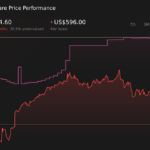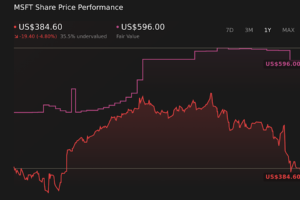Alphabet stock is down 9% in a month and has reached a more attractive valuation.
The “Magnificent Seven” companies — Microsoft, Apple, Nvidia, Alphabet (GOOGL 0.99%) (GOOG 1.05%), Amazon, Meta Platforms (META 0.60%), and Tesla — are known for their growth prospects and rewarding long-term shareholders with epic gains, but not so much for being value stocks.
However, earnings growth and a recent sell-off in Alphabet stock have pushed its forward price-to-earnings ratio below that of the S&P 500. The forward P/E ratio is based on projections for the next 12 months rather than the trailing 12 months of earnings.
Here’s whether or not the cheapest Magnificent Seven stock is worth buying now.

Image source: Getty Images.
Alphabet has plenty of strengths
At first glance, Alphabet looks way too cheap to ignore.

GOOGL PE Ratio (Forward) data by YCharts.
In addition to its inexpensive valuation, the company is nothing short of a cash cow. It has a diversified business across Google Search, Google Cloud, Android, and YouTube. The conglomerate also has plenty of long-term growth projects — such as Waymo, Google Fiber, and DeepMind — one of Alphabet’s AI research and development subsidiaries.
It exited its recent quarter with a whopping $110.9 billion in cash, cash equivalents, and marketable securities compared to just $13.3 billion in long-term debt.
Earlier this year, Alphabet initiated its first-ever quarterly dividend payment. Along with its massive stock buyback program, Alphabet is returning plenty of money to shareholders.
Despite its strengths, there are a few reasons for concern about investing in Alphabet.
Alphabet faces numerous challenges
Alphabet has been in the spotlight for a recent antitrust ruling that could change its business practices. But big tech companies are no strangers to antitrust threats.
Amazon’s retail business and cloud infrastructure division, Amazon Web Services (AWS), have long been under the antitrust microscope. Earlier this year, Apple suffered a sell-off in response to a U.S. Department of Justice civil antitrust lawsuit for monopolizing smartphone markets. While the ruling, on its own, isn’t enough to offset all of Alphabet’s pros, it’s definitely a red flag.
While investors shouldn’t brush off the antitrust ruling, the more significant long-term threat is the state of some of Alphabet’s core business segments. Alphabet has been a pioneer in artificial intelligence (AI) for years, as AI is a core driver of Google’s search algorithm. Google’s virtual monopoly over search may be threatened by innovative tools, like OpenAI’s SearchGPT, which came out in July.
Google Cloud is a distant third behind AWS and Microsoft Azure regarding cloud infrastructure market share.
When it comes to a high-octane integrated ecosystem of software and hardware, Android, and Google Pixel don’t compare to Apple’s iOS and iPhone.
Competition from Meta Platforms is heating up. In the recent quarter, Alphabet generated $66.3 billion in revenue from Google Services and $23.5 billion in operating income. Google Services include Google Search, YouTube ads, Google Network, and Google subscriptions, platforms, and devices. Meanwhile, Meta Platforms’ Family of Apps, which includes Instagram, Facebook, and WhatsApp, generated $38.7 billion in sales and $19.3 billion in operating income — making it nearly as big as Google Services from an operating income perspective and much higher margin.
In the same quarter five years ago, Alphabet generated $38.9 billion in revenue and $9.2 billion in operating income compared to $16.6 billion in revenue for Meta Platforms and $4.6 billion in operating income.
The key takeaway is that Meta’s Family of Apps is faster growing and has a higher margin than Google Search and YouTube. If Meta continues capturing screen time and market share, advertisers may divert funds away from YouTube and move toward Instagram instead.
The ongoing rise of mobile versus desktop is yet another factor here, as Instagram is built for mobile, whereas YouTube is more built for desktop.
Alphabet isn’t a screaming buy
Alphabet’s results are excellent and will probably continue to impress in the short term. However, there are major question marks concerning the business’s long-term trajectory.
Antitrust challenges are a drop in the bucket compared to Alphabet’s slew of competition across its business units. Alphabet can make improvements to ward off the threat of SearchGPT and other AI-powered engines. But it can’t as easily make a product that directly competes with Instagram — which leaves YouTube vulnerable to eroding market share over time.
Alphabet isn’t an expensive stock, so it’s not a bad buy now. But I wouldn’t be surprised if the company enters a period of slowing growth until it meaningfully innovates again.
Randi Zuckerberg, a former director of market development and spokeswoman for Facebook and sister to Meta Platforms CEO Mark Zuckerberg, is a member of The Motley Fool’s board of directors. John Mackey, former CEO of Whole Foods Market, an Amazon subsidiary, is a member of The Motley Fool’s board of directors. Suzanne Frey, an executive at Alphabet, is a member of The Motley Fool’s board of directors. Daniel Foelber has no position in any of the stocks mentioned. The Motley Fool has positions in and recommends Alphabet, Amazon, Apple, Meta Platforms, Microsoft, Nvidia, and Tesla. The Motley Fool recommends the following options: long January 2026 $395 calls on Microsoft and short January 2026 $405 calls on Microsoft. The Motley Fool has a disclosure policy.










